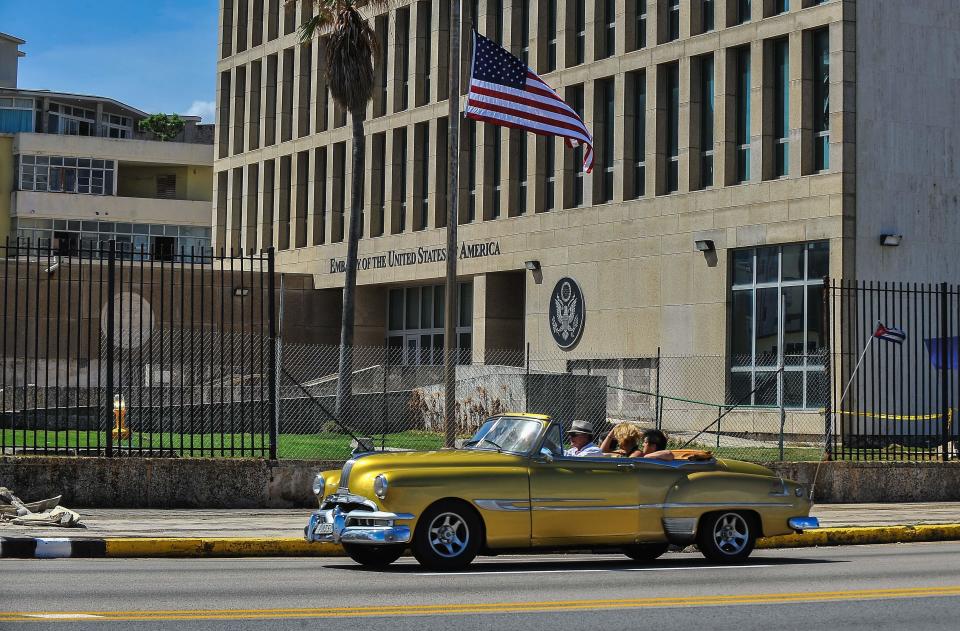Havana syndrome attacks linked to Russian spy unit, new 60 minutes report reveals
- Oops!Something went wrong.Please try again later.
A former senior CIA officer who was forced to retire over a brain injury caused by a suspected “Havana Syndrome” attack has called for congressional hearings after a new report linked Russia to mysterious neurological symptoms that have plagued U.S. diplomats and spies for nearly a decade.
The report comes a little more than a year after the U.S. intelligence community concluded it was “very unlikely a foreign adversary is responsible” for the sometimes-debilitating headaches, dizziness, memory loss and buzzing in the ears reported by dozens of American personnel.
“It's not conclusive, but it's certainly compelling that the Russians are involved in it,” former intelligence officer Marc Polymeropoulos told USA TODAY, reacting to the new report. Polymeropoulos has become a public face and advocate for current and former U.S. officials who say they suffer from Havana Syndrome.
“How do you reconcile that with the analytic assessment” downplaying foreign hostile actors, he asked. “It makes absolutely no sense.”
More: VP Kamala Harris' Vietnam visit delayed by possible case of Havana syndrome
A joint investigation by “60 Minutes,” the Latvia-based news site The Insider, and the German newsmagazine Der Spiegel reported Sunday that senior members of Unit 29155 of the Russian GRU military intelligence agency have received awards and promotions for their work related to the development of "non-lethal acoustic weapons."
The reporting points to attacks by Russian intelligence against American diplomatic personnel and their families that victims have long alleged. The reports said that U.S. intelligence officers who had served in Kyiv in 2014 − as Ukraine and the U.S. moved closer together and Russia first began to seize territory in eastern Ukraine − appear to have been tracked and targeted in subsequent postings.

A deputy to CIA director William Burns was reportedly evacuated from India in 2021 during a similar attack.
American personnel in Cuba, China, Vietnam, Germany and elsewhere have all reported a similar range of symptoms. Among those personnel were members of a team that traveled to Vietnam ahead of a visit by Vice President Kamala Harris in August 2021. Harris’ touchdown in Hanoi was delayed as security officials worked to confirm she could land in safety.
What is Havana Syndrome?
The strange symptoms reported by U.S. personnel have been described as “Anomolous Health Incidents,” but are commonly known as “Havana Syndrome,” because they first gained prominence among American diplomats in Cuba in 2016.
Officials reported headaches, nausea, dizziness and pain. Reports then emerged of similar unexplained symptoms from U.S. diplomats and spies in China.
While the incidents left victims with enduring symptoms of concussion and other brain trauma, exams showed scant signs of injury, though doctors for some victims have reported unexplained damage to the bones of the inner ear.
More: US intel community concludes it's 'very unlikely' foreign adversaries caused 'Havana Syndrome'
Some researchers have suggested Havana Syndrome was akin to mass hysteria – a cluster of brain injuries caused by the very fear of an attack.
Two reports by the National Institutes of Health published in March found “no significant difference” when comparing MRI brain images of 81 Havana Syndrome victims with those from 48 members of a control group.
But Dr. David Reiman of Stanford University published an accompanying opinion piece noting that he had participated in earlier studies that said the symptoms were “potentially caused by an external mechanism.”
A Russian assassination unit
Much of the new reporting released on Sunday focused on the GRU’s Unit 29155, which was implicated in the nerve agent poisoning of former Russian spy Sergei Skripal and his daughter Yulia in London in 2018.
Using leaked mobile phone data and other information, reporters were able to place members of Unit 29155 at locations where American government personnel experienced signs of a Havana Syndrome – just prior to or at the time of the attack.
These include incidents in Frankfurt, Germany, in 2014, in Guangzhou, China, in 2017, and in Tblisi, the capital of the former Soviet republic of Georgia, in 2021, “60 Minutes,” The Insider and Der Speigel reported.
Two senior members of the unit were rewarded with promotions to plum political jobs in Russia’s Far East.
Kremlin spokesman Dmitry Peskov called the reports "nothing more than baseless, unfounded accusations by the media."
Avoiding confrontation?
Greg Edgreen, the Pentagon official who ran the military’s investigation into Havana Syndrome, told "60 Minutes" that the U.S. government set the bar for proof of foreign actors impossibly high.
“If my mother had seen what I saw, she would say, 'It's the Russians, stupid,'” he told the program
Molly McKew, an expert on information warfare who served as an advisor to former Georgian president Mikhail Saakashvili from 2009 to 2013, said Edgreen’s comments and the new report underscore how reluctant Washington is to point the finger at Moscow.
“No U.S. administration wants to have a response to Russian aggression, so they decide not to recognize it for what it is,” McKew said on social media. “Which leaves Americans undefended in crucial aspects, and our policy on Russia fundamentally nonsensical.”
Rep. Jim Himes of Connecticut, the ranking Democrat on the House intelligence committee, said he "will make appropriate inquiries with the Intelligence Community based on the information presented publicly," the committee's minority staff said in a statement to USA TODAY. "Since the earliest reports, the Committee has been focused on ensuring that those who experience AHIs receive all the care and support they need. We will continue to oversee this important issue.”

In 2021, President Joe Biden signed the Havana Act, which allows the CIA, the State Department and other agencies “to provide payments to agency personnel who incur brain injuries from hostilities while on assignment.”
In a statement, the Office of the Director of National Intelligence stood by its 2023 assessment that Havana Syndrome symptoms are probably not the result of a foreign actor.
“These findings do not call into question the very real experiences and symptoms that our colleagues and their family members have reported,” the statement said. “We continue to prioritize our work on such incidents, allocating resources and expertise across the government, pursuing multiple lines of inquiry and seeking information to fill the gaps we have identified."
The White House said in a statement that it had ordered agencies to “prioritize investigations” into the cause of Havana Syndrome and “to ensure that U.S. Government personnel and their families…receive the support and timely access to medical care that they need….”
Since the report aired Sunday evening, Polymeropoulos said, “I've gotten hit up by half a dozen senior (CIA) Directorate of Operations officials, and senior chiefs of station in the field, and they all find the new reporting compelling.”
Polymeropoulos returned to the 2023 intelligence community assessment. “So what's going on?” he said. “I think you absolutely need congressional hearings because we have to find out what happened with this analytic methodology to get it so wrong.”
This article originally appeared on USA TODAY: Havana syndrome solved? Attacks linked to Russia spy unit: 60 minutes

